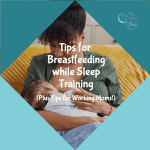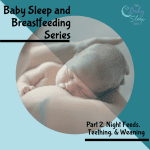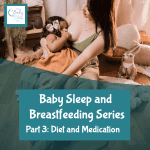
Readers, you probably know by now that we’re a little (or maybe a lot) passionate about sleep training at the Baby Sleep Site. But here’s something we’re equally passionate about: helping breastfeeding moms sleep train in a way that won’t jeopardize their commitment to breastfeeding.
We’ve written about the relationship between baby sleep and breastfeeding. Today, though, we’re bringing you a fresh perspective. It comes from Miriam, who is highly qualified to speak on this subject since she’s an International Board Certified Lactation Consultant with experience as a labor and delivery nurse.
Today, Miriam will answer a few common questions that many breastfeeding families have about sleep training.
Will sleep training affect my milk supply?
Miriam: It can, but it definitely doesn’t have to. And The Baby Sleep Site will work to make sure that it doesn’t. Sleep training with The Baby Sleep Site™ is very personalized. They take into account you and your baby’s unique needs and develop a plan that will help you protect your breastfeeding relationship while achieving better sleep for you and your baby.
What is “sleeping through the night”, and how does it work with breastfeeding?
Miriam: Newborns (1-4 months) are sleeping through the night when they sleep five hours at a time. Most breastfeeding mothers can go one five hour stretch per 24 hours without breastfeeding and experience no ill effect on milk supply. Newborns should NOT be left to cry it out in order to achieve this five hour stretch, however. There are other techniques that can promote this five hour stretch in the middle of the night. Essential Keys To Your Newborn’s Sleep outlines newborn-friendly sleep coaching strategies for your newborn, including sample sleep-inducing routines. You may also want to consider a special newborn-focused Personalized Sleep Plan™ that is crafted to guide your baby to better sleep in a gentle, safe way.
Babies (5-9 months) sleep through the night when they achieve 6-8 hours of continuous nighttime sleep. Many breastfeeding mothers can go one 6-8 hour stretch per 24 hours (at 5-9 months) between breastfeedings without causing a drop in milk supply. A few mothers can go even longer.
Can I really go 6-8 hours straight without nursing? How can I know for sure that this won’t ruin my milk supply?
Miriam: You first have to determine the size of the milk storage inside your breasts. Some breasts look big on the outside but have small storage capacities on the inside. Others look small but can store a lot of milk, so it’s all about the amount of storage capacity inside the breast.
Think of your breasts like two measuring cups. Each woman has a different sized set of measuring cups. In fact, some women find that each breast is a different size! Most women find when they pump that one breast will supply more milk than the other. For instance, one breast may provide 3 ounces and the other breast may provide 4 ounces. You can pump* your breasts when they feel full to find out how much milk your breasts can store at one time. Usually, you will get the most milk just before the first nursing of the day.
If pumping isn’t the best solution for you, you can have your baby weighed before and after a feeding by a nurse or lactation consultant. Many hospitals, lactation consultants, and clinics will do this for free. Babies take different amounts of milk at different feedings. So for an estimate of how much your breasts store at one time, weigh the baby before and after they’ve had one of their larger meals. Of course, your breasts are more like a river than a lake, in that the milk is constantly being made, but some breasts do store more at one time than others, and this will affect how often your baby needs to nurse.
If you are able to store 6 or more ounces in your “measuring cups,” then you can probably go 6-8 hours without affecting your milk supply. Most babies who are exclusively breastfeeding drink 25-35 ounces of milk per day. Moms who routinely store 6 or more ounces of milk in their breasts at one time may be able to feed their babies 5-6 times per day (although this also depends on the appetite of the baby.)
Remember too that some babies have reflux or small stomach capacities and cannot tolerate large amounts of milk. These babies will need to eat more often even if the moms can store a great deal of milk at one time.
* Note: If you want to pump in order to find out approximately how much milk your breasts hold, be sure to use a good hospital-grade breast pump. Also, remember that no pump is going to be as effective at emptying your breasts as your baby is. The amount you’re able to pump with a high-quality pump will be at least slightly less than your baby can draw out of your breasts. Finally, don’t be overly concerned if you’re not able to pump out much milk. Pumping can take time and plenty of patience! And… This exercise of measuring your cups isn’t meant to frighten or frustrate you!
Help, Miriam — my “measuring cups” are small! What does that mean for my baby’s sleep?
Miriam: Moms who store less than 6 ounces at a time (those who have smaller “measuring cups”) can still make plenty of milk, because overall milk production is not dependent on the size of the “measuring cups.” Your body can make plenty of milk as long as there is a place for the milk to go. Moms with smaller cups need to feed their babies more frequently to keep room in the storage space for more milk. So a mom who has a storage space of 3 ounces can still exclusively breastfeed. However, she will need to feed her baby 9-12 times per day for the entire time of exclusive breastfeeding. This is much different than a mom who can store 8 ounces and may need to feed her baby just 5 times per day. What’s important is for your baby to get the number of ounces he needs to thrive. It doesn’t matter so much if he gets that amount in 5 feedings, 7 feedings, or 10 feedings.
I only store 3 ounces of milk at a time. This means that while I am breastfeeding my son, I need to continue offering night feedings. This helps him to be able to grow well. My sister, however, can store 11 ounces of milk at a time! She only needs to nurse 5-6 times per day to maintain a supply. I’m so glad I’m the older sister and had my baby first, because my expectations would have been way off, if I had expected to only need to nurse 5-6 times per day. Our different breastmilk storage capacities mean that we have different daytime and nighttime feeding and sleep routines. The great thing is that we can both have healthy, breastfed babies.
So if my “measuring cups” are small, does that mean I’m going to spend the next year being chronically exhausted?!
Miriam: Not at all! Each of us is different. Our babies are unique individuals as well. It seems a little silly to expect all mother-baby pairs to need the same schedules and routines! The good news is that all moms can get better sleep with a little help.
Even a mom like me who only stores 3 ounces at a time can still get better sleep at night. Here is a sample feeding and sleep schedule for a mom with a small storage capacity of 3 ounces and a baby over 2 months:
Wake up time 8:00am /feeding
Feeding 10:00am/nap
Feeding 1:00pm /nap
Feeding 2:00pm
Feeding 4:00pm/nap
Feeding 6:00pm
Feeding 8:00pm
Feeding 10:00pm
Feeding 3:00amNote that newborns may need one (or even two) extra feedings between 10 p.m. and 8 a.m. After 7-9 months, the amount of feedings may drop to 7-8 if baby does well on solid food, and it is cleared with the baby’s doctor, because the baby will be replacing some breast milk calories with calories from solid foods.
Remember, if you have concerns about your baby’s growth or the number of feedings he needs, contact his doctor or a lactation consultant who can evaluate your baby in person. Keep in mind, too, that a baby’s weight gain is the BEST indicator of adequate growth.
So there it is: breastfeeding and sleep training really CAN go together. You don’t have to forsake sleep in order to breastfeed well. You also don’t have to forsake breastfeeding in order to get some sleep! Nursing mamas – you can breastfeed and teach baby to sleep through the night. You can breastfeed and help your baby learn to nap soundly.
That’s right, readers — when it comes to nursing and sleep, you can “have your cake and eat it, too”! 🙂
Hang in there, nursing moms: You CAN be successful at Breastfeeding AND Baby Sleep Training!
Additional Resources:








